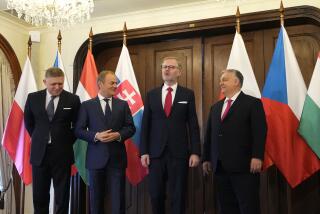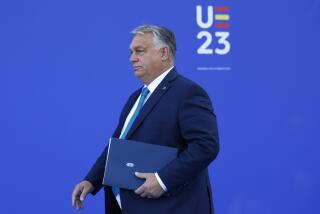CRISIS IN THE KREMLIN : NATO Takes Hard Line With Soviets : Europe: Despite the collapse of the hard-line coup, the Western alliance issues a blunt communique. : E. Europe Ecstatic
- Share via
PRAGUE, Czechoslovakia — East Europeans rejoiced Wednesday as the hard-line Soviet coup in Moscow collapsed on the anniversary of the 1968 Soviet-led invasion of Czechoslovakia. “This is the end of communism,” said Czechoslovak Economics Minister Vladimir Dlouhy.
Thousands of Czechs rejoiced on Prague’s Wenceslas Square, site of a rally Wednesday to mark the anniversary of the invasion and, in 1989, the first unfolding of the “velvet revolution” that ended Communist rule in Czechoslovakia. “There is some justice in history,” said Michael Zantovsky, spokesman for President Vaclav Havel. “This had to happen exactly on the day Soviet tanks rolled into Prague 23 years ago.”
After Monday’s coup, many Eastern Europeans worried about the course the new hard-line government might take. Although the Warsaw Pact has been dissolved and Soviet soldiers have pulled out of Czechoslovakia and Hungary, 45,000 Red Army troops remain in Poland and 273,000 in eastern Germany.
In Warsaw, about 100 people gathered in front of a television set in the Polish capital’s central rail station to watch the main evening newscast, almost entirely devoted to the Soviet crisis. “It is a triumph of democracy,” said Henrik Puzon, a worker from Lodz, of the failure of the anti-Gorbachev coup.
Bulgarian President Zhelyu Zhelev told state television, “The failure of the coup has shown that communism is really going from Europe and from . . . the world.” He wished the Soviet people a “successful parting” with communism.
But others struck notes of caution. Havel said in a telegram to Gorbachev, “the triumph of law and democracy in this situation is a good sign.” But he told the CTK news agency that the Soviets have a long way to go before achieving democracy: “The battle is not definitively won. The process of building democracy and a new state structure in the Soviet Union will be long and complicated.”
Hungarian Prime Minister Jozsef Antall also said the coup should inspire Western Europe to integrate fledgling eastern democracies into its fold all the faster: “The government of Hungary is convinced that upon the events of the last days, the advanced democracies will look upon the dangers threatening our region more realistically, and this will give an impetus to all those endeavors which aim at our region’s quicker integration into Europe.”
More to Read
Sign up for Essential California
The most important California stories and recommendations in your inbox every morning.
You may occasionally receive promotional content from the Los Angeles Times.













